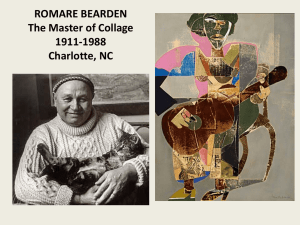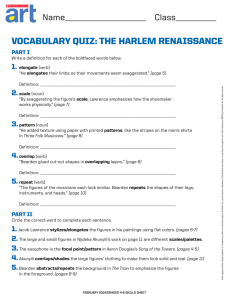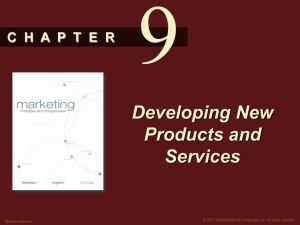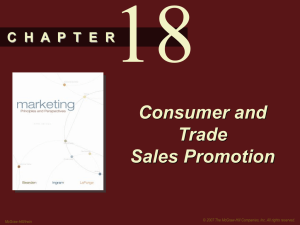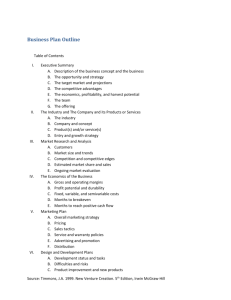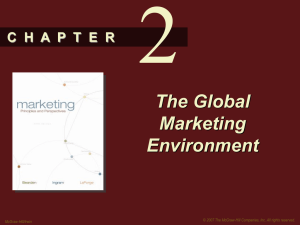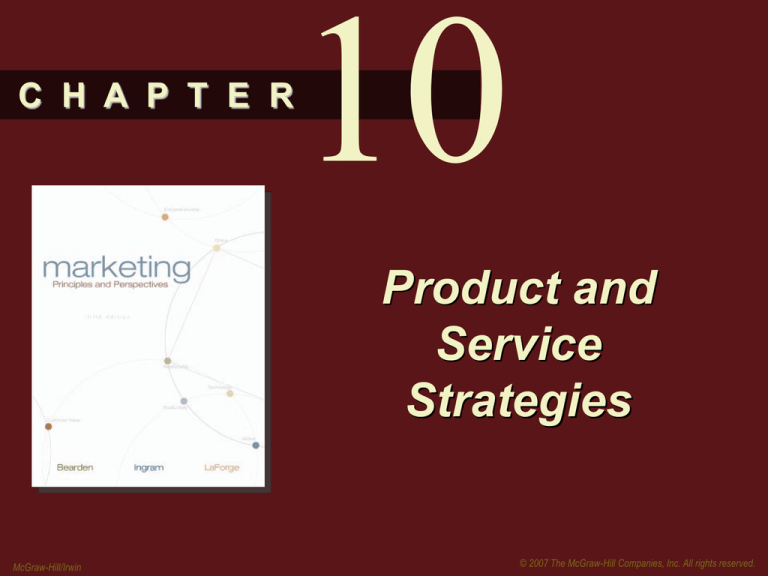
C H A P T E R
10
Product and
Service
Strategies
McGraw-Hill/Irwin
© 2007 The McGraw-Hill Companies, Inc. All rights reserved.
Learning Objectives
After studying this chapter, you should be able to:
Understand the different characteristics of a product
mix.
Recognize the stages and characteristics of the
product life cycle.
Identify appropriate marketing strategies for products
in different life cycle stages.
Describe the limitations of the product life cycle
concept.
Discuss different product-mix and product-line
strategies.
Bearden Marketing 5th Ed
10-2
© 2007 The McGraw-Hill Companies, Inc. All rights reserved.
Starbucks
The first Starbucks coffee shop was at Pike Place
Market in Seattle in 1971. The concept was successful,
and 165 Starbucks locations were open in 1992 when
the company went public. The chain now has more than
9,000 retail locations in the United States and
internationally.
Bearden Marketing 5th Ed
10-3
© 2007 The McGraw-Hill Companies, Inc. All rights reserved.
Product Mix
Product Mix
A product mix is the total assortment
of products and services marketed by
a firm.
Product Line
A product line is a group of individual
products that are closely related in
some way.
Individual
Product
An individual product is any brand
or variant of a brand in a product line.
Thus a product mix is a combination of product
lines, which are combinations of individual products.
Bearden Marketing 5th Ed
10-4
© 2007 The McGraw-Hill Companies, Inc. All rights reserved.
Product Mix Characteristics
Any product mix can be defined in terms of width, length,
and consistency.
Product Mix
Width
The number of product lines in the
product mix. The more product lines,
the wider the product mix.
Product Mix
Length
Product mix length refers to the
number of products in a product line.
Product Mix
Consistency
Product mix consistency refers to
the relatedness of the different
product lines in a product mix.
Bearden Marketing 5th Ed
10-5
© 2007 The McGraw-Hill Companies, Inc. All rights reserved.
Product Mix Characteristics
Exhibit 10-1
Bearden Marketing 5th Ed
10-6
© 2007 The McGraw-Hill Companies, Inc. All rights reserved.
Product Mix Characteristics
Firms marketing multiple products and services must
devise strategies for individual products, specific product
lines, and the overall product mix. Key strategies at each
level are presented below:
Exhibit 10-2
Bearden Marketing 5th Ed
10-7
© 2007 The McGraw-Hill Companies, Inc. All rights reserved.
Product Life Cycle
The product life cycle (PLC), like the biological life
cycle, describes the advancement of products through
identifiable stages of their existence as shown below:
Exhibit 10-3
Bearden Marketing 5th Ed
10-8
© 2007 The McGraw-Hill Companies, Inc. All rights reserved.
Diffusion Process
When a new product form is first introduced to the
market, consumers go through a process in determining
whether to adopt it. Some consumers adopt a new
product when it is first introduced; others wait until the
innovation has been on the market for some time. These
different adoption rates mean that it typically takes time
for an innovative new product form to diffuse throughout
a market. The diffusion process describes the adoption
of an innovation over time.
Exhibit 10-4
Bearden Marketing 5th Ed
10-9
© 2007 The McGraw-Hill Companies, Inc. All rights reserved.
PLC Stages and Characteristics
The interaction of the diffusion process and firm
competition means that marketers face a different
situation at each stage of the product life cycle.
Exhibit 10-5
Bearden Marketing 5th Ed
10-10
© 2007 The McGraw-Hill Companies, Inc. All rights reserved.
PLC Length and Shape
Life cycle curves for styles, fashions, and fads differ from
traditional product life cycle curves:
Exhibit 10-6
Bearden Marketing 5th Ed
10-11
© 2007 The McGraw-Hill Companies, Inc. All rights reserved.
PLC Marketing Strategies
Shortening lengths of product life cycles and their
different shapes increase the complexity of marketing
decisions. Firms respond to these trends by developing
marketing strategies to take advantage of each life cycle
stage.
Bearden Marketing 5th Ed
10-12
© 2007 The McGraw-Hill Companies, Inc. All rights reserved.
Limitations of the PLC
1. The life cycle concept applies best to product
forms rather than to classes of products or
specific brands.
2. The life cycle concept may lead marketers to
think that a product has a predetermined life,
which may produce problems in interpreting
sales and profits.
3. It is only a descriptive way of looking at the
behavior of a product and the life cycle can
not predict the behavior of a product.
Bearden Marketing 5th Ed
10-13
© 2007 The McGraw-Hill Companies, Inc. All rights reserved.
Increasing the Product Line
Downward
Stretch
A downward-stretch strategy is an
attempt to add products to the lower end
of the product line. Luxury car makers
are introducing lower-priced cars to get
new customers.
Upward
Stretch
An upward-stretch strategy is just the
opposite: Products are added at the
higher end of a product line. This has
been a favorite approach for Japanese
companies in the U.S. market.
more
Bearden Marketing 5th Ed
10-14
© 2007 The McGraw-Hill Companies, Inc. All rights reserved.
Increasing the Product Line (con’t)
Two-way
Stretch
Line Filling
A two-way-stretch strategy entails
adding products at both the high and low
ends of the product line. Firms that have
focused on the mass market might use
this strategy to appeal to both priceconscious and luxury-seeking consumers.
A line-filling strategy involves adding
products in different places within a
product line. A firm might use this strategy
to fill gaps in its product line that are not at
the high or low end.
more
Bearden Marketing 5th Ed
10-15
© 2007 The McGraw-Hill Companies, Inc. All rights reserved.
Increasing the Product Line (con’t)
Cannibalization occurs when a new
Cannibalization product takes sales away from existing
products. A great deal of cannibalization
shifts sales from one product to the new
product, with little overall gain for the firm.
Bearden Marketing 5th Ed
10-16
© 2007 The McGraw-Hill Companies, Inc. All rights reserved.
Product-Mix Strategies
The product mix consists of all product lines and
individual products marketed by a firm.
Most firms market multiple product lines with
many products in each line.
However, sometimes companies can be very
successful by having a limited product mix.
Bearden Marketing 5th Ed
10-17
© 2007 The McGraw-Hill Companies, Inc. All rights reserved.
Branding Strategies
As firms expand product mixes and extend product lines,
brand decisions become more complicated. Companies
marketing multiple products and services need a
strategy to guide branding decisions. The basic options
are:
Exhibit 10-8
Bearden Marketing 5th Ed
10-18
© 2007 The McGraw-Hill Companies, Inc. All rights reserved.
Ethical Issues
Is the product safe when used as intended?
Is the product safe when misused in a way that is
foreseeable?
Have any competitors’ patents or copyrights been
violated?
Is the product compatible with the physical environment?
Is the product environmentally compatible when
disposed of?
Do any organizational stakeholders object to the
product?
Bearden Marketing 5th Ed
10-19
© 2007 The McGraw-Hill Companies, Inc. All rights reserved.
Summary
After studying this chapter, you should be able to:
Understand the different characteristics of a product
mix.
Recognize the stages and characteristics of the
product life cycle.
Identify appropriate marketing strategies for products in
different life cycle stages.
Describe the limitations of the product life cycle
concept.
Discuss different product-mix and product-line
strategies.
Bearden Marketing 5th Ed
10-20
© 2007 The McGraw-Hill Companies, Inc. All rights reserved.


